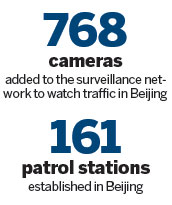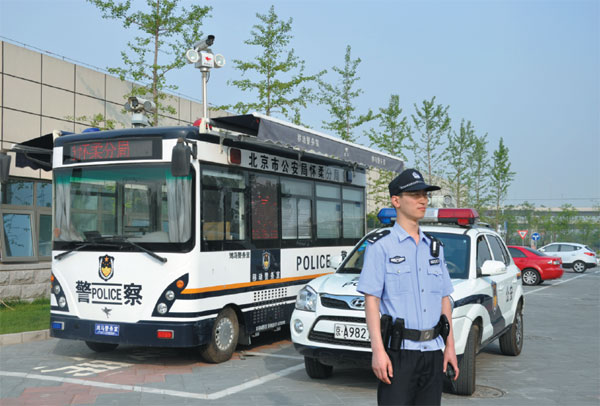

Beijing bureau to safeguard event with help of advanced technology
Beijing police have made the security of the APEC meeting their top priority, with ample preparations for the event that is considered to be as important as the 2008 Olympic Games.
The meeting, which runs from Nov 5 through 11 in Beijing's downtown and Huairou district, is the biggest event in the city, and its security arrangements are on a par with the 2008 Olympics, said Fu Zhenghua, chief of the capital's public security bureau.
To improve security during the meeting, the municipal police, especially in Huairou, have enhanced their procedures since 2013, including helicopter patrols and increased drills and inspections using advanced technology.
The capital's police bureau bought its second mid-sized helicopter in May 2013 and installed high-definition video systems on both aircraft, which can quickly send video recordings from the air to a control center, said Zhu Pengfei, an officer on the bureau's police aviation team.
"The system can provide convenience for us to follow up situations in the air and on the ground, and after one year of use, I think, our helicopter team has become a 'backbone' for ensuring the APEC meeting's security," Zhu said.

The helicopters accommodate four people and have more room for medical staff to store equipment, he said.
"We also take charge of monitoring air transportation and tackling emergencies, and such patrols will continue in the city's key areas during the meeting," he added.
The bureau also added 768 cameras to its surveillance network, mainly focused on bus lanes across the city, according to a statement from the authority.
"The new cameras, which are bigger than the old ones, not only record violations by vehicles, but also take clearer pictures in dim areas," said Lin Songke, head of the technology and information office in the bureau's traffic department.
For some areas around shopping malls and colleges, which experience traffic jams and disorder, "we will increase the frequency of the cameras' recording," Lin said.
The public security authority in the district also installed 1,000 high-definition video surveillance cameras that are capable of identifying a person's face within 30 meters, said Li Bingjian, deputy chief of the Science, Information and Communication Department of the district's police sub-bureau.
"We're confident that this surveillance system can effectively monitor all entry and exit points on the district's borders and all the critical, densely populated areas, such as schools, gas stations and commercial areas," Li said.
The bureau has also devoted a 1-meter-high explosive ordnance disposal robot, which was imported in 2008, to help police enter dangerous areas, according to Xing Zhigang, a member of the authority's SWAT team.
"The robot can boost our work efficiency and protect police officers' security," Xing said. "Some other advanced equipment for security checks has also been used for the meeting, such as X-ray devices."
The bureau has also established 161 patrol stations in the city, and police are required to be on duty around the clock, the statement said.
Every station covers at least 12 square kilometers and is equipped with equipment such as helmets, shields and batons, a police patrol officer said, adding that the equipment will continue to be used after the meeting.
Fu, the police chief, said the prevention of terrorism is the core of the bureau's work. He added that the city's security and police officers must perform at their best level, as they did during the 2008 Olympics.
Contact the writer at caoyin@chinadaily.com.cn
 |
|
The Beijing public security bureau has established patrol stations throughout the city, with officers on duty 24 hours a day. The bureau has also added surveillance cameras and deployed two helicopters and an explosive ordnance disposal robot to improve security for the APEC meetings in Beijing from Nov 5 through 11. Provided to China Daily |